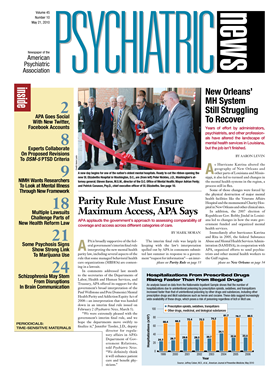A two-year, multisite, randomized clinical trial sponsored by the National Institute of Mental Health (NIMH) will test a comprehensive package of pharmacologic and psychosocial treatments for first-episode psychosis against standard care in “real-world settings” using existing financing structures.
The Recovery After an Initial Schizophrenia Episode (RAISE) study will test an “optimal” intervention for first-episode psychosis, including psychopharmacology and a range of psychosocial services.
To carry out the study, NIMH has contracted with two groups—one led by John Kane, M.D., chair of psychiatry at the Zucker Hillside Hospital in New York, and the other by Jeffrey Lieberman, M.D., chair of psychiatry at Columbia University College of Physicians and Surgeons, and Lisa Dixon, M.D., director of the Division of Services Research at the University of Maryland.
Together, the two groups will enroll more than 700 first-episode patients and follow them for two years. Enrollment is beginning this year and will continue into 2011; the study will be completed in 2013.
(In the study led by Kane, “first episode” is defined as having less than four months total lifetime exposure to antipsychotic medication. In the Lieberman/Dixon study, it is defined as having experienced psychotic symptoms for fewer than two years, regardless of exposure to antipsychotics.)
“The aim of RAISE is to develop a comprehensive, integrated treatment intervention for first-episode psychosis that would promote symptom recovery, minimize disability, and maximize vocational and social functioning and be deliverable in real-world settings using current funding mechanisms,” Kane told Psychiatric News.
That means that while NIMH will help pay for staffing and training and other ancillary expenses, the services themselves must be paid for by existing sources.
Robert Heinssen, Ph.D., the NIMH coordinator of the study, noted that funding for the RAISE study derives in part from money NIMH received through the American Recovery and Reinvestment Act of 2009, which was enacted to stimulate multiple sectors of the economy during the recession.
“There is an emerging literature that gives us confidence that if we treated people early, closer to the onset of their psychosis, and in a sustained manner with a combination of pharmacologic and psychosocial treatments, it may be possible to either slow or halt the clinical and functional deterioration that we typically see in schizophrenia,” Heinssen noted.
He said that NIMH commissioned a health economist to estimate possible cost savings from successful early intervention; that estimate found that if the unemployment rate among people with schizophrenia—which is about 90 percent—could be reduced by 10 percent, it would translate into savings of $2.5 billion.
“If we were to knock that down to 70 percent to 80 percent—which is clearly within our ability to do—that would translate into $6.3 billion in savings,” he said.
Project Tests ‘Real-World’ Interventions
If that sounds too good to be true, a signal feature of the RAISE project is its commitment to “get real.”
“NIMH asked us to test an optimized treatment, not in a rarified academic setting, but in a way that was generalizable to real-world settings in the context of existing reimbursement mechanisms,” Lieberman told Psychiatric News.
Lieberman's group—which includes investigators from Columbia, Maryland, Dartmouth, Duke, University of California at Los Angeles (UCLA), University of North Carolina, University of California at Davis, and Harvard—has partnered with state mental health agencies in New York and Maryland to provide the experimental and comparator intervention.
“This in effect becomes a demonstration project in those two states,” he said. “If the intervention is proven successful, it can become a model for the standard of care.”
A Bold Experiment Begins
Lieberman says the RAISE study represents a bold new experiment in translating research to clinical practice. “With RAISE, we are at a pivotal juncture where the fruits of over two decades of research will be put to the test and, if successful, will almost immediately be able to transfer into clinical practice.”
Kane is leading a group with colleagues from Dartmouth, University of North Carolina at Chapel Hill, Yale, University of Calgary, UCLA, and SUNY Downstate Medical Center. That group is recruiting 35 sites across the country willing to implement the optimal intervention with administrative support and sufficient funding.
“We want to change the way people view this illness from one that has an invariably bad prognosis,” Kane said. “We believe that by providing early intervention and optimized treatment early in the course of the illness, we have our best shot at improving the trajectory of the illness over time.”

